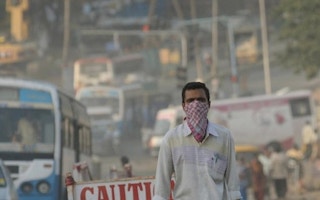The smog is a local hazard: Reduced visibility grounded planes in New Delhi in December, while toxic amounts of particulate matter kept Beijing residents indoors several days last month.
New research showing that a component of this pollution also plays a big role in global warming could boost efforts to make air-pollution control in Asia part of the international climate agenda.
A study last month by the International Global Atmospheric Chemistry Project found black carbon or soot – the smoky particles released by inefficient burning of fuel – to be the second biggest contributor to warming after carbon dioxide.
The findings are especially relevant for India and China, which are among the biggest emitters of black carbon, largely from the use of coal and wood for cooking and heating, and from the rising number of vehicles on the road.
But with both countries wary of a focus that would push more of the climate burden onto them, and considerable scientific uncertainty remaining over soot’s effects, experts here say that domestic concern about public health is still the most potent reason to cut emissions in the region.
Click here to read the full story.










